QUTIC Time Management Investigation: Problems, Skills, and Solutions
VerifiedAdded on 2023/03/17
|10
|2304
|40
Report
AI Summary
This report presents an investigation into time management practices at QUTIC, based on a survey of 20 staff members. The study explores the positive effects of good time management, emphasizing its crucial role in the workplace. The findings reveal that procrastination, heavy workloads, lack of methods, lack of confidence, and homesickness are significant challenges faced by individuals. The research highlights the importance of skills such as to-do lists, setting deadlines, scheduling tasks, prioritization, and starting tasks early to improve time management. The report recommends that employees recognize the importance of time management, address the problems they face, and adopt effective strategies to enhance their productivity, ultimately leading to better outcomes for both the individual and the organization. The study concludes that while time management is critical, spending time on enjoyment can negatively impact work efficiency.
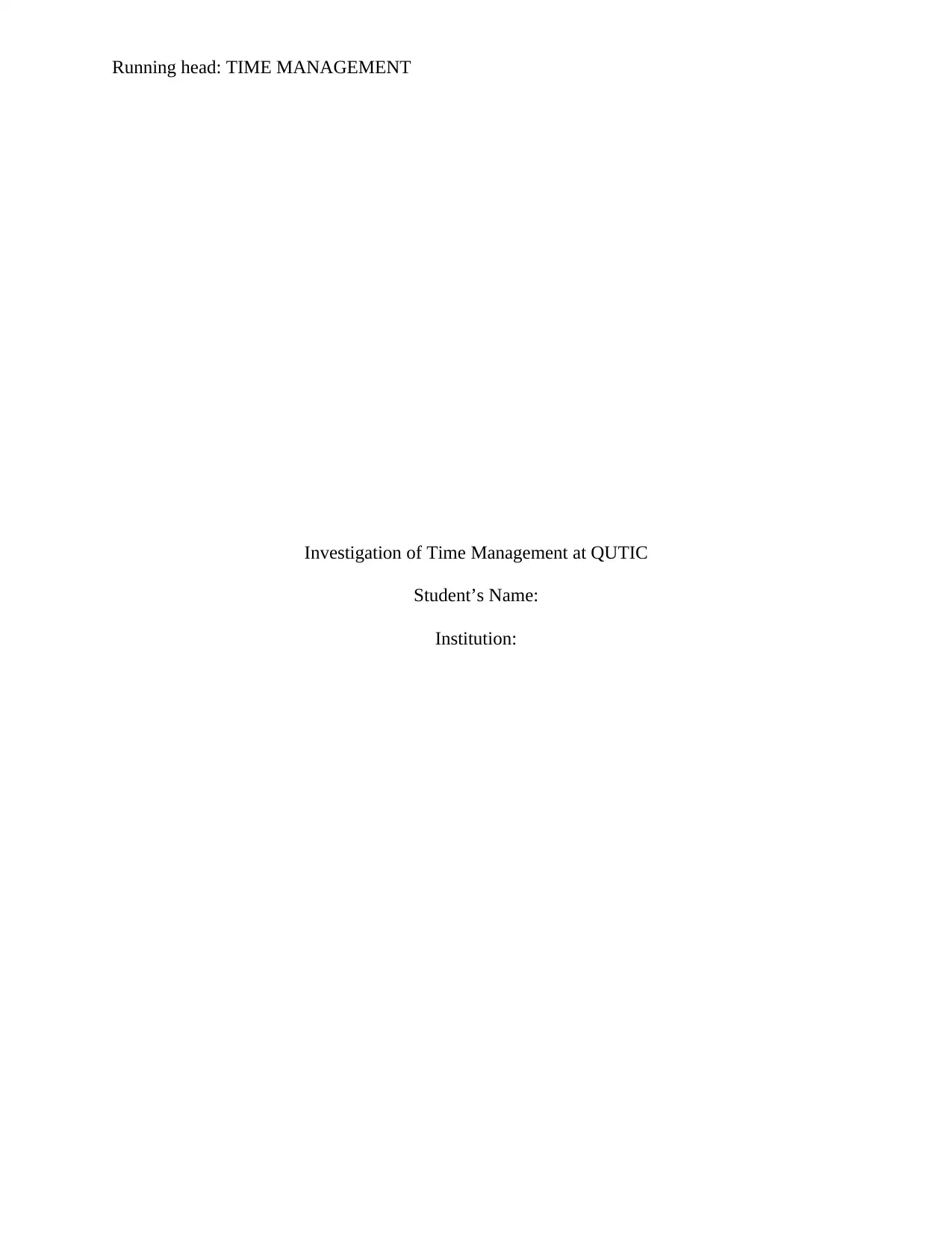
Running head: TIME MANAGEMENT
Investigation of Time Management at QUTIC
Student’s Name:
Institution:
Investigation of Time Management at QUTIC
Student’s Name:
Institution:
Paraphrase This Document
Need a fresh take? Get an instant paraphrase of this document with our AI Paraphraser
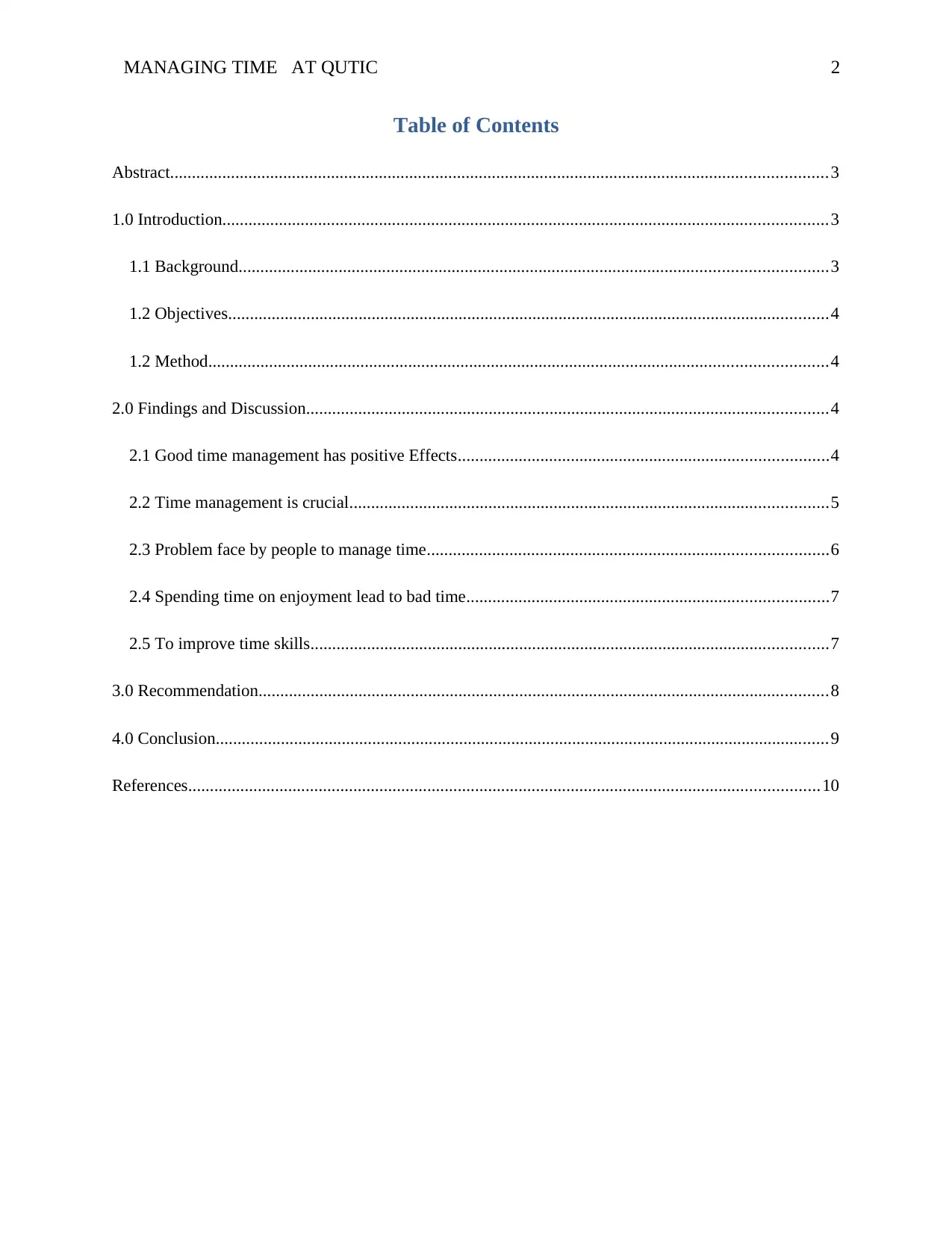
MANAGING TIME AT QUTIC 2
Table of Contents
Abstract.......................................................................................................................................................3
1.0 Introduction...........................................................................................................................................3
1.1 Background.......................................................................................................................................3
1.2 Objectives..........................................................................................................................................4
1.2 Method..............................................................................................................................................4
2.0 Findings and Discussion........................................................................................................................4
2.1 Good time management has positive Effects.....................................................................................4
2.2 Time management is crucial..............................................................................................................5
2.3 Problem face by people to manage time............................................................................................6
2.4 Spending time on enjoyment lead to bad time...................................................................................7
2.5 To improve time skills.......................................................................................................................7
3.0 Recommendation...................................................................................................................................8
4.0 Conclusion.............................................................................................................................................9
References.................................................................................................................................................10
Table of Contents
Abstract.......................................................................................................................................................3
1.0 Introduction...........................................................................................................................................3
1.1 Background.......................................................................................................................................3
1.2 Objectives..........................................................................................................................................4
1.2 Method..............................................................................................................................................4
2.0 Findings and Discussion........................................................................................................................4
2.1 Good time management has positive Effects.....................................................................................4
2.2 Time management is crucial..............................................................................................................5
2.3 Problem face by people to manage time............................................................................................6
2.4 Spending time on enjoyment lead to bad time...................................................................................7
2.5 To improve time skills.......................................................................................................................7
3.0 Recommendation...................................................................................................................................8
4.0 Conclusion.............................................................................................................................................9
References.................................................................................................................................................10
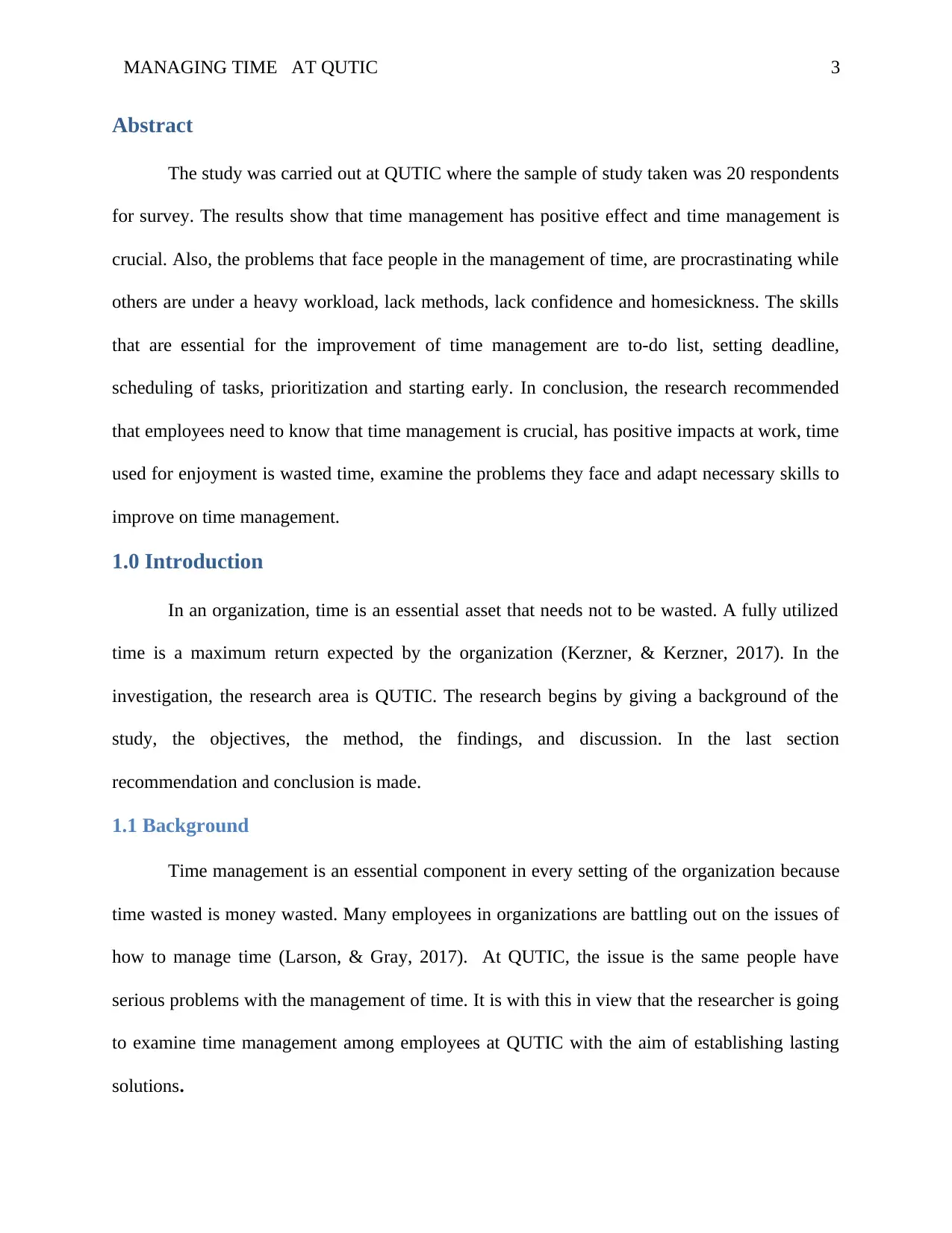
MANAGING TIME AT QUTIC 3
Abstract
The study was carried out at QUTIC where the sample of study taken was 20 respondents
for survey. The results show that time management has positive effect and time management is
crucial. Also, the problems that face people in the management of time, are procrastinating while
others are under a heavy workload, lack methods, lack confidence and homesickness. The skills
that are essential for the improvement of time management are to-do list, setting deadline,
scheduling of tasks, prioritization and starting early. In conclusion, the research recommended
that employees need to know that time management is crucial, has positive impacts at work, time
used for enjoyment is wasted time, examine the problems they face and adapt necessary skills to
improve on time management.
1.0 Introduction
In an organization, time is an essential asset that needs not to be wasted. A fully utilized
time is a maximum return expected by the organization (Kerzner, & Kerzner, 2017). In the
investigation, the research area is QUTIC. The research begins by giving a background of the
study, the objectives, the method, the findings, and discussion. In the last section
recommendation and conclusion is made.
1.1 Background
Time management is an essential component in every setting of the organization because
time wasted is money wasted. Many employees in organizations are battling out on the issues of
how to manage time (Larson, & Gray, 2017). At QUTIC, the issue is the same people have
serious problems with the management of time. It is with this in view that the researcher is going
to examine time management among employees at QUTIC with the aim of establishing lasting
solutions.
Abstract
The study was carried out at QUTIC where the sample of study taken was 20 respondents
for survey. The results show that time management has positive effect and time management is
crucial. Also, the problems that face people in the management of time, are procrastinating while
others are under a heavy workload, lack methods, lack confidence and homesickness. The skills
that are essential for the improvement of time management are to-do list, setting deadline,
scheduling of tasks, prioritization and starting early. In conclusion, the research recommended
that employees need to know that time management is crucial, has positive impacts at work, time
used for enjoyment is wasted time, examine the problems they face and adapt necessary skills to
improve on time management.
1.0 Introduction
In an organization, time is an essential asset that needs not to be wasted. A fully utilized
time is a maximum return expected by the organization (Kerzner, & Kerzner, 2017). In the
investigation, the research area is QUTIC. The research begins by giving a background of the
study, the objectives, the method, the findings, and discussion. In the last section
recommendation and conclusion is made.
1.1 Background
Time management is an essential component in every setting of the organization because
time wasted is money wasted. Many employees in organizations are battling out on the issues of
how to manage time (Larson, & Gray, 2017). At QUTIC, the issue is the same people have
serious problems with the management of time. It is with this in view that the researcher is going
to examine time management among employees at QUTIC with the aim of establishing lasting
solutions.
⊘ This is a preview!⊘
Do you want full access?
Subscribe today to unlock all pages.

Trusted by 1+ million students worldwide
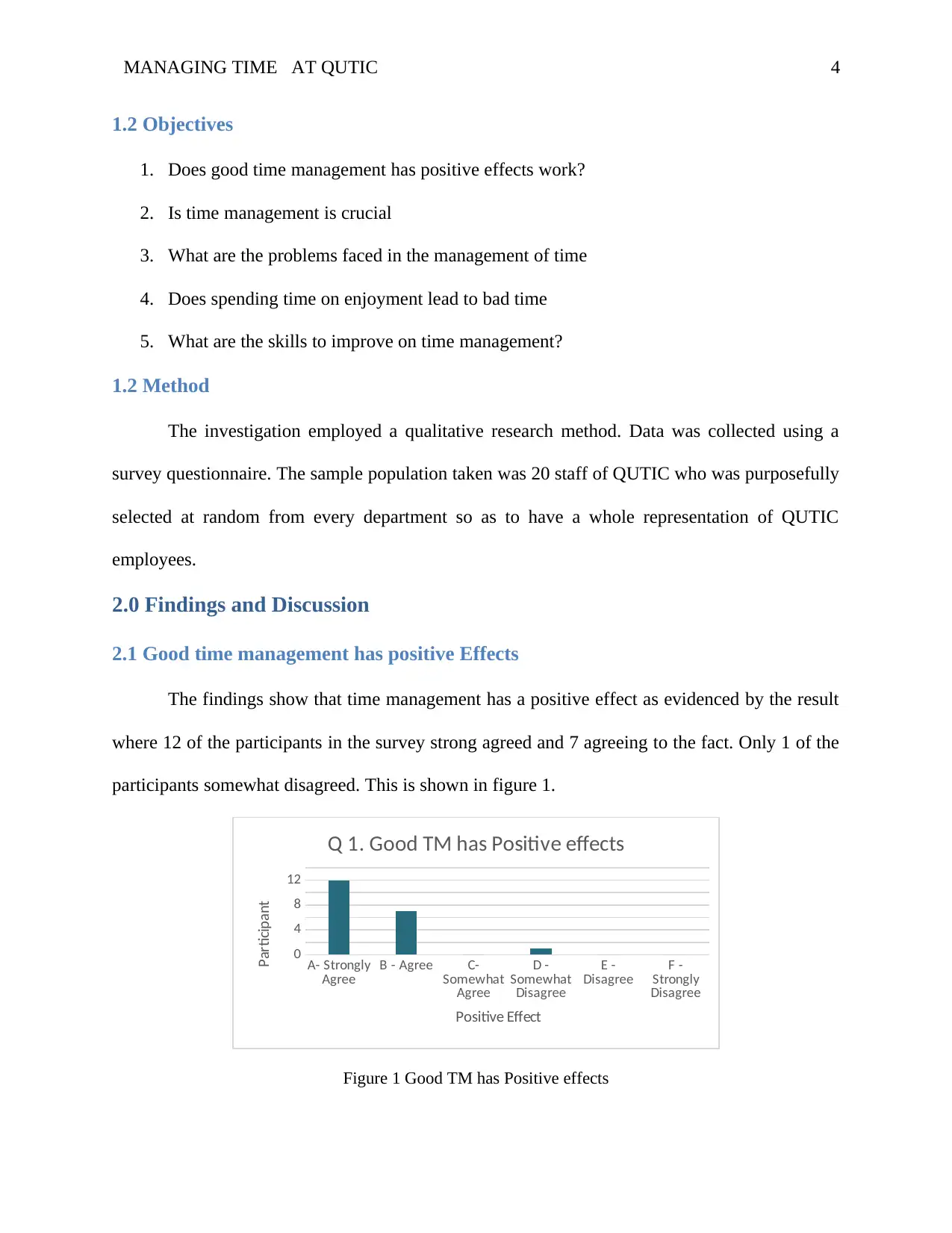
MANAGING TIME AT QUTIC 4
1.2 Objectives
1. Does good time management has positive effects work?
2. Is time management is crucial
3. What are the problems faced in the management of time
4. Does spending time on enjoyment lead to bad time
5. What are the skills to improve on time management?
1.2 Method
The investigation employed a qualitative research method. Data was collected using a
survey questionnaire. The sample population taken was 20 staff of QUTIC who was purposefully
selected at random from every department so as to have a whole representation of QUTIC
employees.
2.0 Findings and Discussion
2.1 Good time management has positive Effects
The findings show that time management has a positive effect as evidenced by the result
where 12 of the participants in the survey strong agreed and 7 agreeing to the fact. Only 1 of the
participants somewhat disagreed. This is shown in figure 1.
A- Strongly
Agree B - Agree C-
Somewhat
Agree
D -
Somewhat
Disagree
E -
Disagree F -
Strongly
Disagree
0
4
8
12
Q 1. Good TM has Positive effects
Positive Effect
Participant
Figure 1 Good TM has Positive effects
1.2 Objectives
1. Does good time management has positive effects work?
2. Is time management is crucial
3. What are the problems faced in the management of time
4. Does spending time on enjoyment lead to bad time
5. What are the skills to improve on time management?
1.2 Method
The investigation employed a qualitative research method. Data was collected using a
survey questionnaire. The sample population taken was 20 staff of QUTIC who was purposefully
selected at random from every department so as to have a whole representation of QUTIC
employees.
2.0 Findings and Discussion
2.1 Good time management has positive Effects
The findings show that time management has a positive effect as evidenced by the result
where 12 of the participants in the survey strong agreed and 7 agreeing to the fact. Only 1 of the
participants somewhat disagreed. This is shown in figure 1.
A- Strongly
Agree B - Agree C-
Somewhat
Agree
D -
Somewhat
Disagree
E -
Disagree F -
Strongly
Disagree
0
4
8
12
Q 1. Good TM has Positive effects
Positive Effect
Participant
Figure 1 Good TM has Positive effects
Paraphrase This Document
Need a fresh take? Get an instant paraphrase of this document with our AI Paraphraser
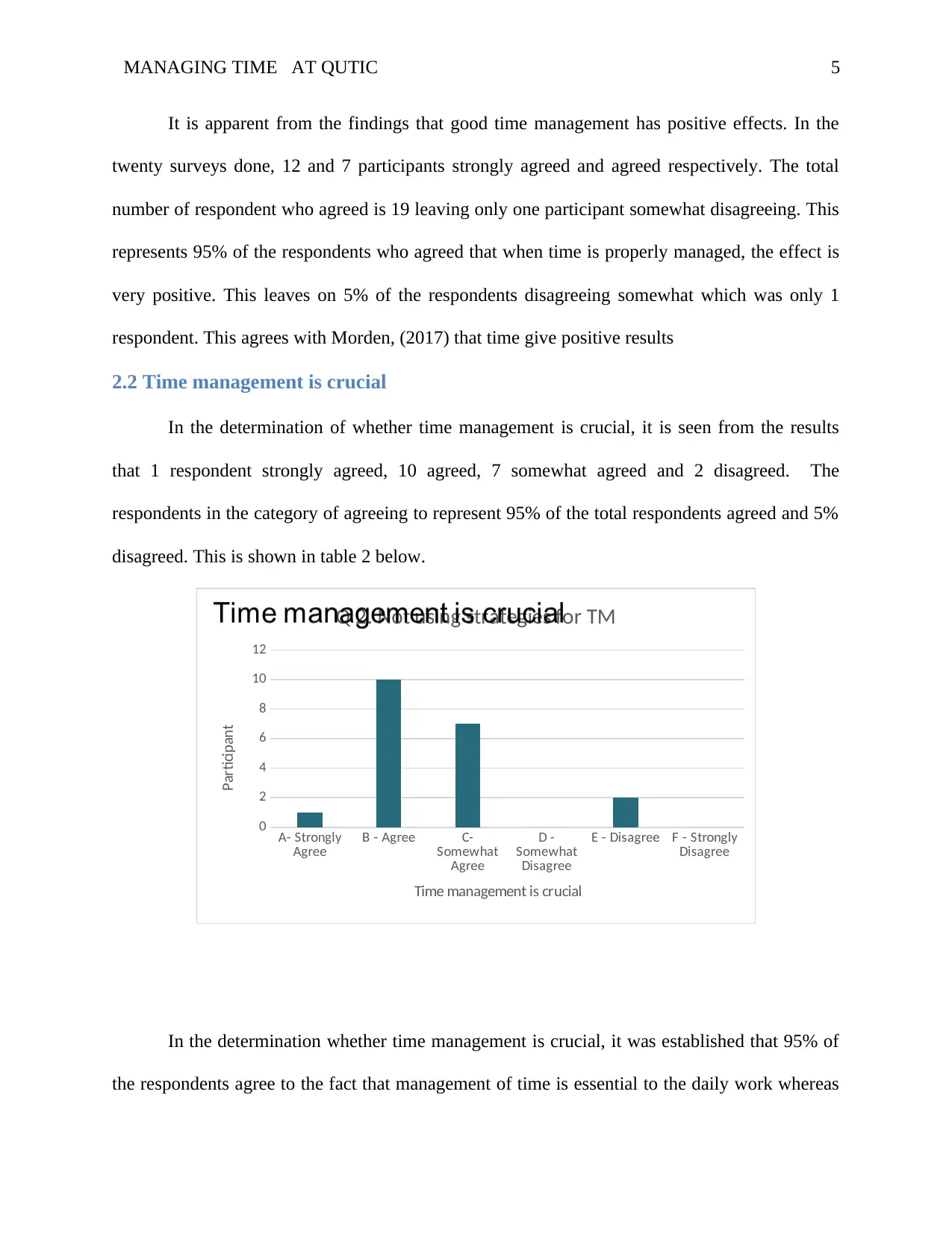
MANAGING TIME AT QUTIC 5
It is apparent from the findings that good time management has positive effects. In the
twenty surveys done, 12 and 7 participants strongly agreed and agreed respectively. The total
number of respondent who agreed is 19 leaving only one participant somewhat disagreeing. This
represents 95% of the respondents who agreed that when time is properly managed, the effect is
very positive. This leaves on 5% of the respondents disagreeing somewhat which was only 1
respondent. This agrees with Morden, (2017) that time give positive results
2.2 Time management is crucial
In the determination of whether time management is crucial, it is seen from the results
that 1 respondent strongly agreed, 10 agreed, 7 somewhat agreed and 2 disagreed. The
respondents in the category of agreeing to represent 95% of the total respondents agreed and 5%
disagreed. This is shown in table 2 below.
A- Strongly
Agree B - Agree C-
Somewhat
Agree
D -
Somewhat
Disagree
E - Disagree F - Strongly
Disagree
0
2
4
6
8
10
12
Q 2. Not using strategies for TM
Time management is crucial
Participant
In the determination whether time management is crucial, it was established that 95% of
the respondents agree to the fact that management of time is essential to the daily work whereas
It is apparent from the findings that good time management has positive effects. In the
twenty surveys done, 12 and 7 participants strongly agreed and agreed respectively. The total
number of respondent who agreed is 19 leaving only one participant somewhat disagreeing. This
represents 95% of the respondents who agreed that when time is properly managed, the effect is
very positive. This leaves on 5% of the respondents disagreeing somewhat which was only 1
respondent. This agrees with Morden, (2017) that time give positive results
2.2 Time management is crucial
In the determination of whether time management is crucial, it is seen from the results
that 1 respondent strongly agreed, 10 agreed, 7 somewhat agreed and 2 disagreed. The
respondents in the category of agreeing to represent 95% of the total respondents agreed and 5%
disagreed. This is shown in table 2 below.
A- Strongly
Agree B - Agree C-
Somewhat
Agree
D -
Somewhat
Disagree
E - Disagree F - Strongly
Disagree
0
2
4
6
8
10
12
Q 2. Not using strategies for TM
Time management is crucial
Participant
In the determination whether time management is crucial, it was established that 95% of
the respondents agree to the fact that management of time is essential to the daily work whereas
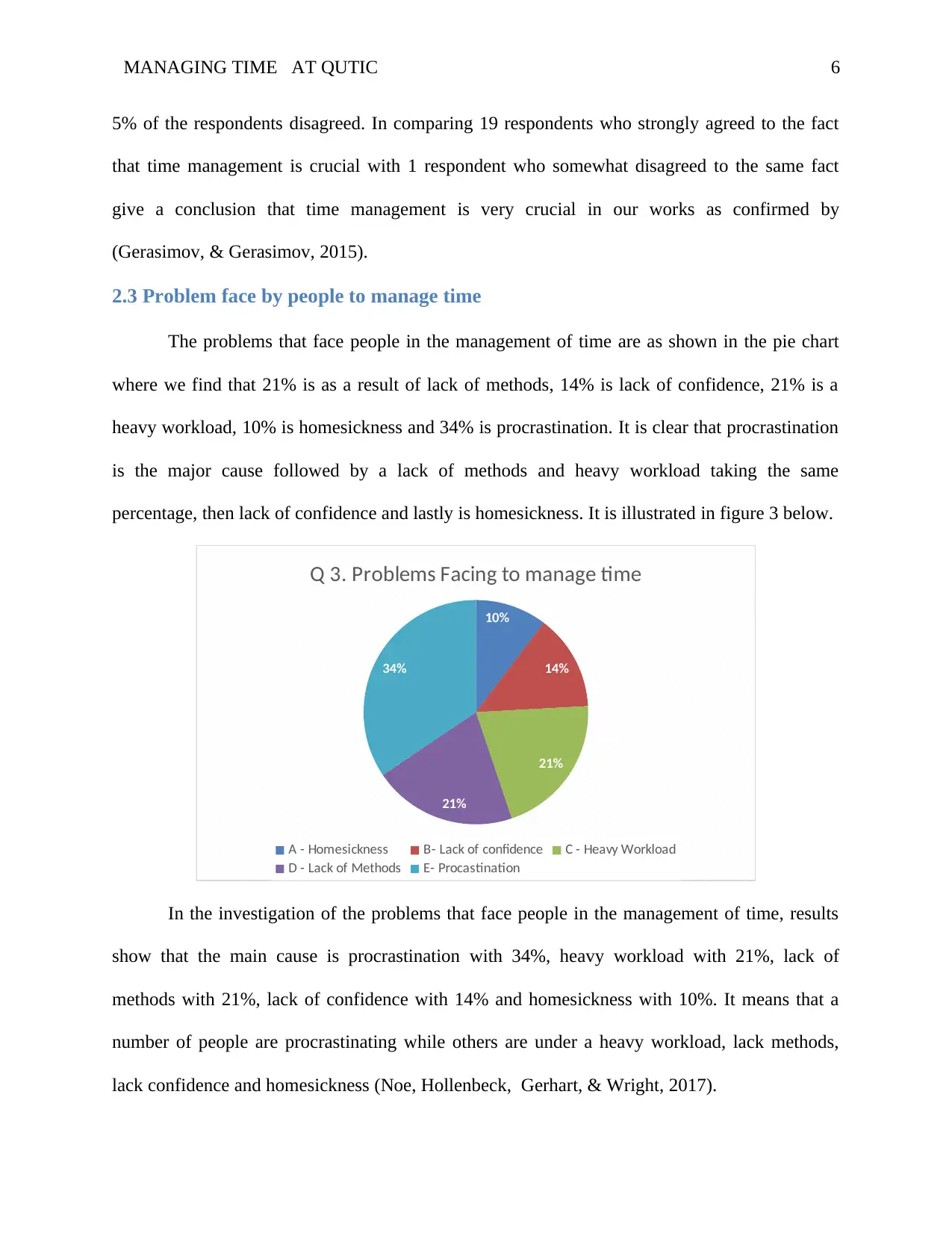
MANAGING TIME AT QUTIC 6
5% of the respondents disagreed. In comparing 19 respondents who strongly agreed to the fact
that time management is crucial with 1 respondent who somewhat disagreed to the same fact
give a conclusion that time management is very crucial in our works as confirmed by
(Gerasimov, & Gerasimov, 2015).
2.3 Problem face by people to manage time
The problems that face people in the management of time are as shown in the pie chart
where we find that 21% is as a result of lack of methods, 14% is lack of confidence, 21% is a
heavy workload, 10% is homesickness and 34% is procrastination. It is clear that procrastination
is the major cause followed by a lack of methods and heavy workload taking the same
percentage, then lack of confidence and lastly is homesickness. It is illustrated in figure 3 below.
10%
14%
21%
21%
34%
Q 3. Problems Facing to manage time
A - Homesickness B- Lack of confidence C - Heavy Workload
D - Lack of Methods E- Procastination
In the investigation of the problems that face people in the management of time, results
show that the main cause is procrastination with 34%, heavy workload with 21%, lack of
methods with 21%, lack of confidence with 14% and homesickness with 10%. It means that a
number of people are procrastinating while others are under a heavy workload, lack methods,
lack confidence and homesickness (Noe, Hollenbeck, Gerhart, & Wright, 2017).
5% of the respondents disagreed. In comparing 19 respondents who strongly agreed to the fact
that time management is crucial with 1 respondent who somewhat disagreed to the same fact
give a conclusion that time management is very crucial in our works as confirmed by
(Gerasimov, & Gerasimov, 2015).
2.3 Problem face by people to manage time
The problems that face people in the management of time are as shown in the pie chart
where we find that 21% is as a result of lack of methods, 14% is lack of confidence, 21% is a
heavy workload, 10% is homesickness and 34% is procrastination. It is clear that procrastination
is the major cause followed by a lack of methods and heavy workload taking the same
percentage, then lack of confidence and lastly is homesickness. It is illustrated in figure 3 below.
10%
14%
21%
21%
34%
Q 3. Problems Facing to manage time
A - Homesickness B- Lack of confidence C - Heavy Workload
D - Lack of Methods E- Procastination
In the investigation of the problems that face people in the management of time, results
show that the main cause is procrastination with 34%, heavy workload with 21%, lack of
methods with 21%, lack of confidence with 14% and homesickness with 10%. It means that a
number of people are procrastinating while others are under a heavy workload, lack methods,
lack confidence and homesickness (Noe, Hollenbeck, Gerhart, & Wright, 2017).
⊘ This is a preview!⊘
Do you want full access?
Subscribe today to unlock all pages.

Trusted by 1+ million students worldwide
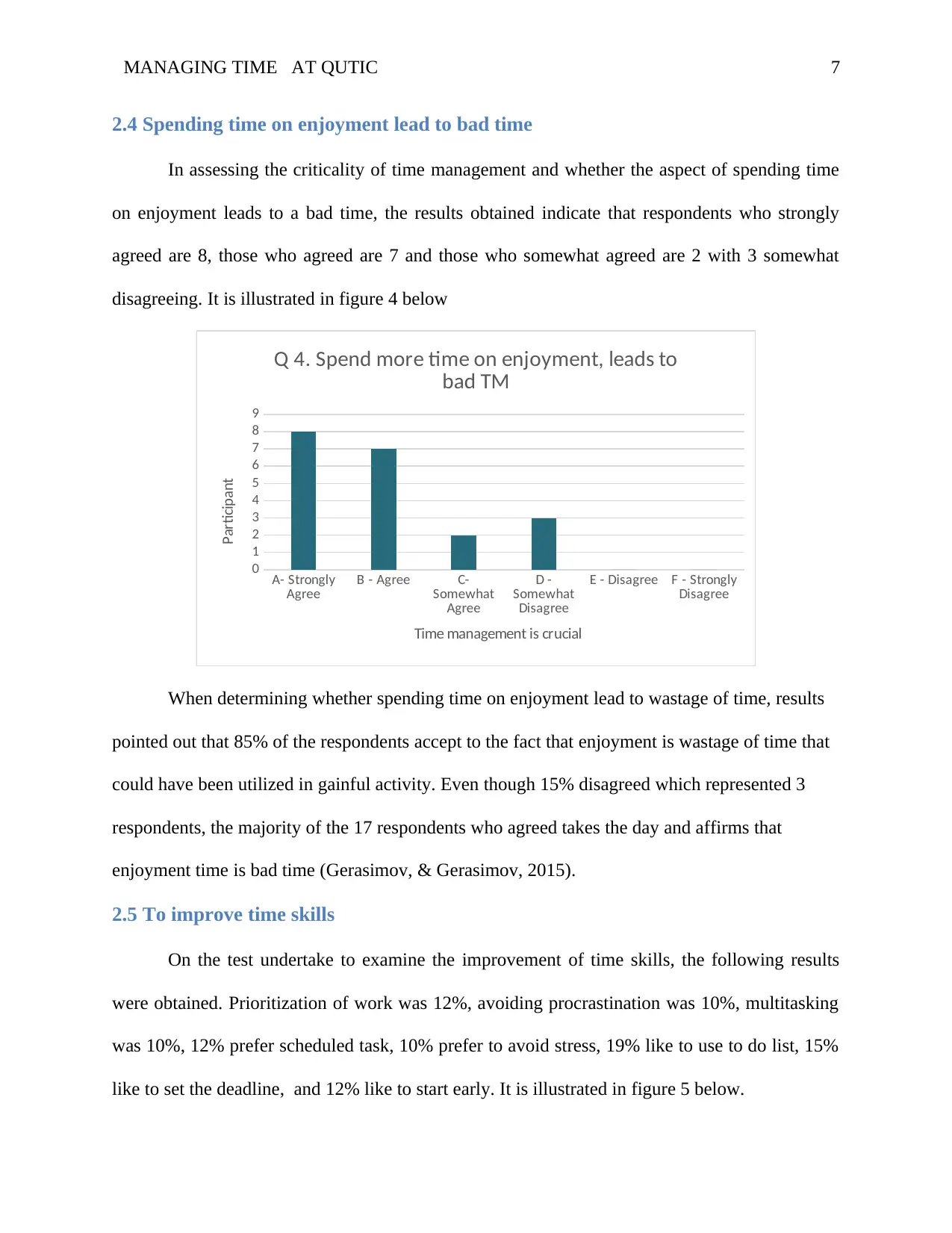
MANAGING TIME AT QUTIC 7
2.4 Spending time on enjoyment lead to bad time
In assessing the criticality of time management and whether the aspect of spending time
on enjoyment leads to a bad time, the results obtained indicate that respondents who strongly
agreed are 8, those who agreed are 7 and those who somewhat agreed are 2 with 3 somewhat
disagreeing. It is illustrated in figure 4 below
A- Strongly
Agree B - Agree C-
Somewhat
Agree
D -
Somewhat
Disagree
E - Disagree F - Strongly
Disagree
0
1
2
3
4
5
6
7
8
9
Q 4. Spend more time on enjoyment, leads to
bad TM
Time management is crucial
Participant
When determining whether spending time on enjoyment lead to wastage of time, results
pointed out that 85% of the respondents accept to the fact that enjoyment is wastage of time that
could have been utilized in gainful activity. Even though 15% disagreed which represented 3
respondents, the majority of the 17 respondents who agreed takes the day and affirms that
enjoyment time is bad time (Gerasimov, & Gerasimov, 2015).
2.5 To improve time skills
On the test undertake to examine the improvement of time skills, the following results
were obtained. Prioritization of work was 12%, avoiding procrastination was 10%, multitasking
was 10%, 12% prefer scheduled task, 10% prefer to avoid stress, 19% like to use to do list, 15%
like to set the deadline, and 12% like to start early. It is illustrated in figure 5 below.
2.4 Spending time on enjoyment lead to bad time
In assessing the criticality of time management and whether the aspect of spending time
on enjoyment leads to a bad time, the results obtained indicate that respondents who strongly
agreed are 8, those who agreed are 7 and those who somewhat agreed are 2 with 3 somewhat
disagreeing. It is illustrated in figure 4 below
A- Strongly
Agree B - Agree C-
Somewhat
Agree
D -
Somewhat
Disagree
E - Disagree F - Strongly
Disagree
0
1
2
3
4
5
6
7
8
9
Q 4. Spend more time on enjoyment, leads to
bad TM
Time management is crucial
Participant
When determining whether spending time on enjoyment lead to wastage of time, results
pointed out that 85% of the respondents accept to the fact that enjoyment is wastage of time that
could have been utilized in gainful activity. Even though 15% disagreed which represented 3
respondents, the majority of the 17 respondents who agreed takes the day and affirms that
enjoyment time is bad time (Gerasimov, & Gerasimov, 2015).
2.5 To improve time skills
On the test undertake to examine the improvement of time skills, the following results
were obtained. Prioritization of work was 12%, avoiding procrastination was 10%, multitasking
was 10%, 12% prefer scheduled task, 10% prefer to avoid stress, 19% like to use to do list, 15%
like to set the deadline, and 12% like to start early. It is illustrated in figure 5 below.
Paraphrase This Document
Need a fresh take? Get an instant paraphrase of this document with our AI Paraphraser
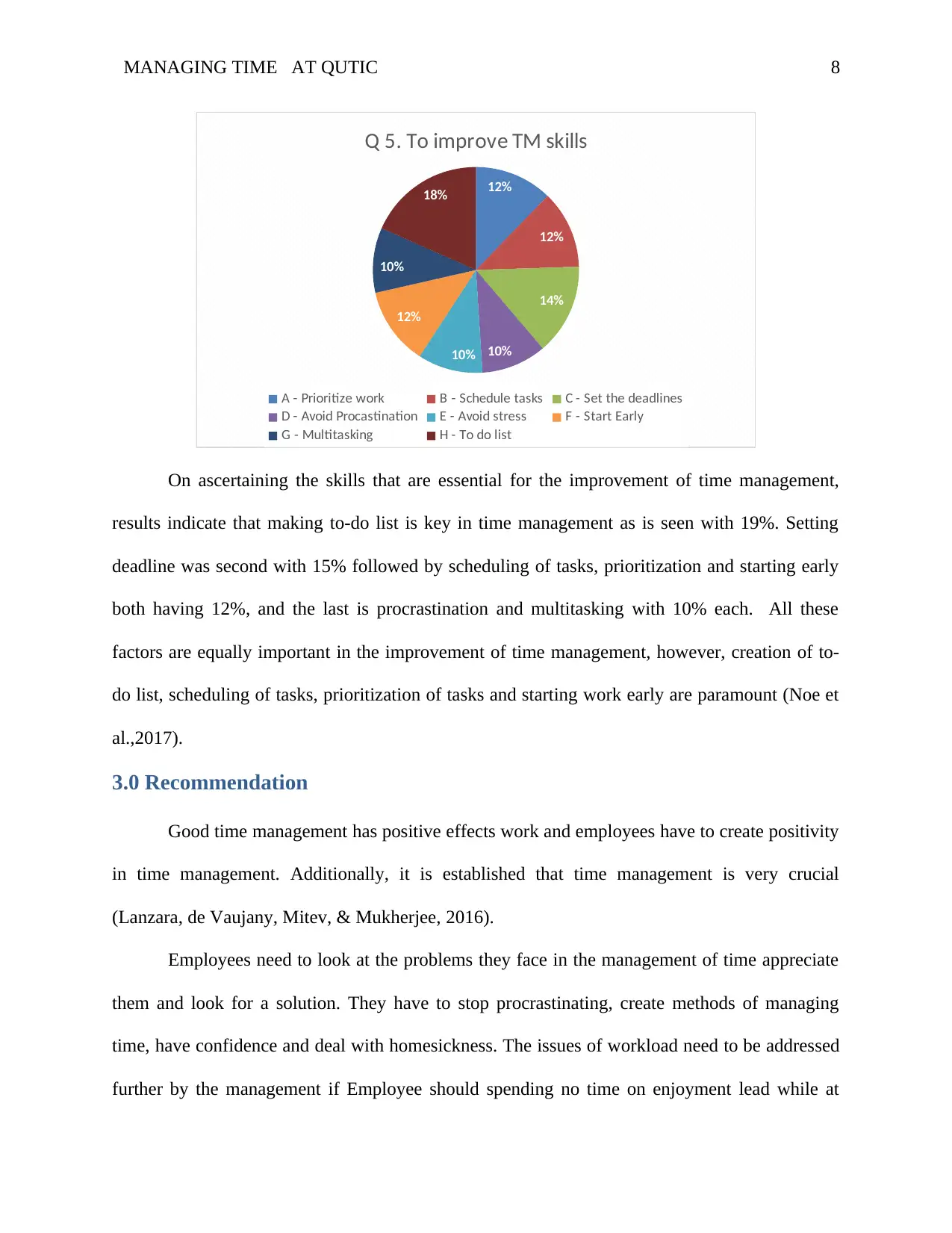
MANAGING TIME AT QUTIC 8
12%
12%
14%
10%10%
12%
10%
18%
Q 5. To improve TM skills
A - Prioritize work B - Schedule tasks C - Set the deadlines
D - Avoid Procastination E - Avoid stress F - Start Early
G - Multitasking H - To do list
On ascertaining the skills that are essential for the improvement of time management,
results indicate that making to-do list is key in time management as is seen with 19%. Setting
deadline was second with 15% followed by scheduling of tasks, prioritization and starting early
both having 12%, and the last is procrastination and multitasking with 10% each. All these
factors are equally important in the improvement of time management, however, creation of to-
do list, scheduling of tasks, prioritization of tasks and starting work early are paramount (Noe et
al.,2017).
3.0 Recommendation
Good time management has positive effects work and employees have to create positivity
in time management. Additionally, it is established that time management is very crucial
(Lanzara, de Vaujany, Mitev, & Mukherjee, 2016).
Employees need to look at the problems they face in the management of time appreciate
them and look for a solution. They have to stop procrastinating, create methods of managing
time, have confidence and deal with homesickness. The issues of workload need to be addressed
further by the management if Employee should spending no time on enjoyment lead while at
12%
12%
14%
10%10%
12%
10%
18%
Q 5. To improve TM skills
A - Prioritize work B - Schedule tasks C - Set the deadlines
D - Avoid Procastination E - Avoid stress F - Start Early
G - Multitasking H - To do list
On ascertaining the skills that are essential for the improvement of time management,
results indicate that making to-do list is key in time management as is seen with 19%. Setting
deadline was second with 15% followed by scheduling of tasks, prioritization and starting early
both having 12%, and the last is procrastination and multitasking with 10% each. All these
factors are equally important in the improvement of time management, however, creation of to-
do list, scheduling of tasks, prioritization of tasks and starting work early are paramount (Noe et
al.,2017).
3.0 Recommendation
Good time management has positive effects work and employees have to create positivity
in time management. Additionally, it is established that time management is very crucial
(Lanzara, de Vaujany, Mitev, & Mukherjee, 2016).
Employees need to look at the problems they face in the management of time appreciate
them and look for a solution. They have to stop procrastinating, create methods of managing
time, have confidence and deal with homesickness. The issues of workload need to be addressed
further by the management if Employee should spending no time on enjoyment lead while at
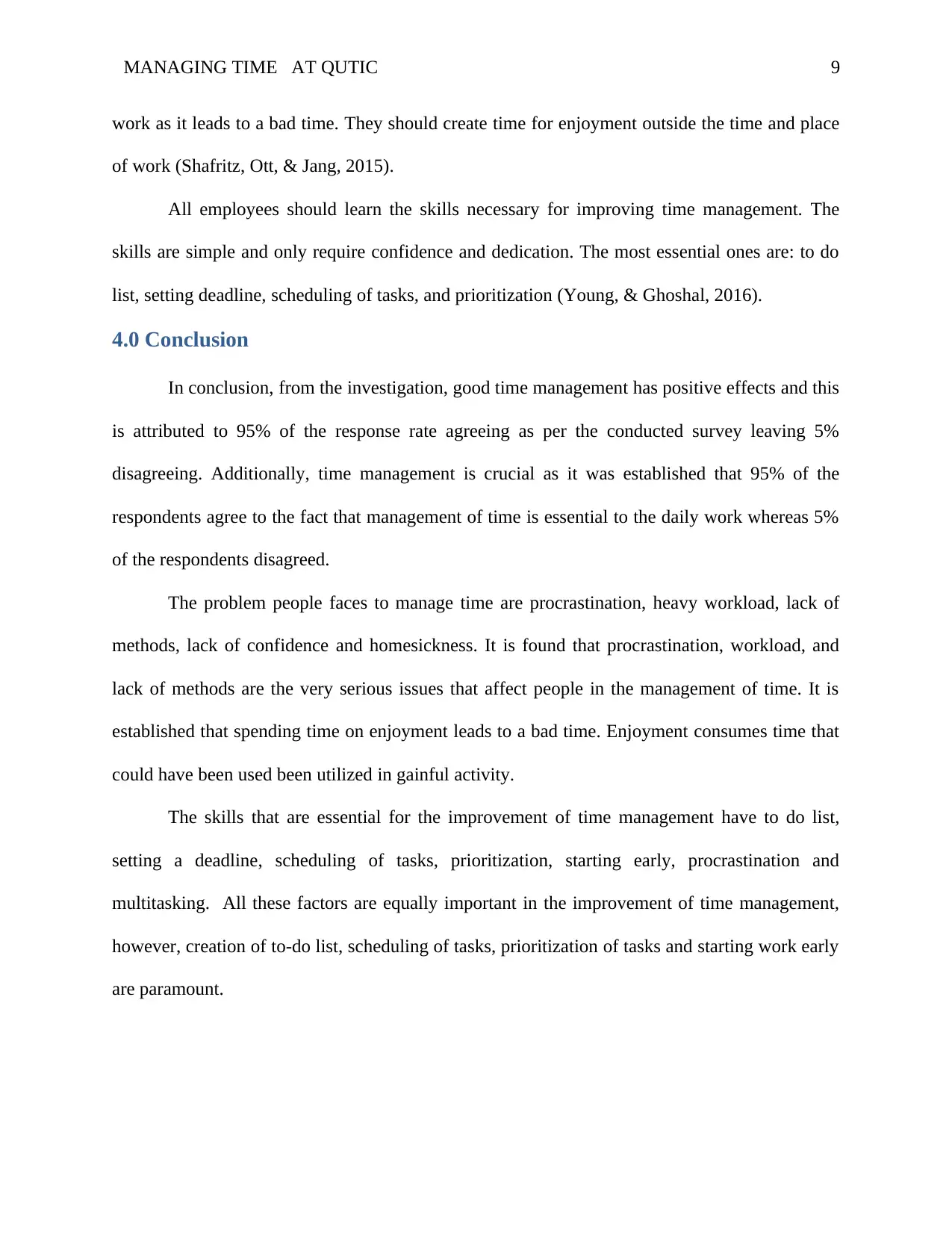
MANAGING TIME AT QUTIC 9
work as it leads to a bad time. They should create time for enjoyment outside the time and place
of work (Shafritz, Ott, & Jang, 2015).
All employees should learn the skills necessary for improving time management. The
skills are simple and only require confidence and dedication. The most essential ones are: to do
list, setting deadline, scheduling of tasks, and prioritization (Young, & Ghoshal, 2016).
4.0 Conclusion
In conclusion, from the investigation, good time management has positive effects and this
is attributed to 95% of the response rate agreeing as per the conducted survey leaving 5%
disagreeing. Additionally, time management is crucial as it was established that 95% of the
respondents agree to the fact that management of time is essential to the daily work whereas 5%
of the respondents disagreed.
The problem people faces to manage time are procrastination, heavy workload, lack of
methods, lack of confidence and homesickness. It is found that procrastination, workload, and
lack of methods are the very serious issues that affect people in the management of time. It is
established that spending time on enjoyment leads to a bad time. Enjoyment consumes time that
could have been used been utilized in gainful activity.
The skills that are essential for the improvement of time management have to do list,
setting a deadline, scheduling of tasks, prioritization, starting early, procrastination and
multitasking. All these factors are equally important in the improvement of time management,
however, creation of to-do list, scheduling of tasks, prioritization of tasks and starting work early
are paramount.
work as it leads to a bad time. They should create time for enjoyment outside the time and place
of work (Shafritz, Ott, & Jang, 2015).
All employees should learn the skills necessary for improving time management. The
skills are simple and only require confidence and dedication. The most essential ones are: to do
list, setting deadline, scheduling of tasks, and prioritization (Young, & Ghoshal, 2016).
4.0 Conclusion
In conclusion, from the investigation, good time management has positive effects and this
is attributed to 95% of the response rate agreeing as per the conducted survey leaving 5%
disagreeing. Additionally, time management is crucial as it was established that 95% of the
respondents agree to the fact that management of time is essential to the daily work whereas 5%
of the respondents disagreed.
The problem people faces to manage time are procrastination, heavy workload, lack of
methods, lack of confidence and homesickness. It is found that procrastination, workload, and
lack of methods are the very serious issues that affect people in the management of time. It is
established that spending time on enjoyment leads to a bad time. Enjoyment consumes time that
could have been used been utilized in gainful activity.
The skills that are essential for the improvement of time management have to do list,
setting a deadline, scheduling of tasks, prioritization, starting early, procrastination and
multitasking. All these factors are equally important in the improvement of time management,
however, creation of to-do list, scheduling of tasks, prioritization of tasks and starting work early
are paramount.
⊘ This is a preview!⊘
Do you want full access?
Subscribe today to unlock all pages.

Trusted by 1+ million students worldwide
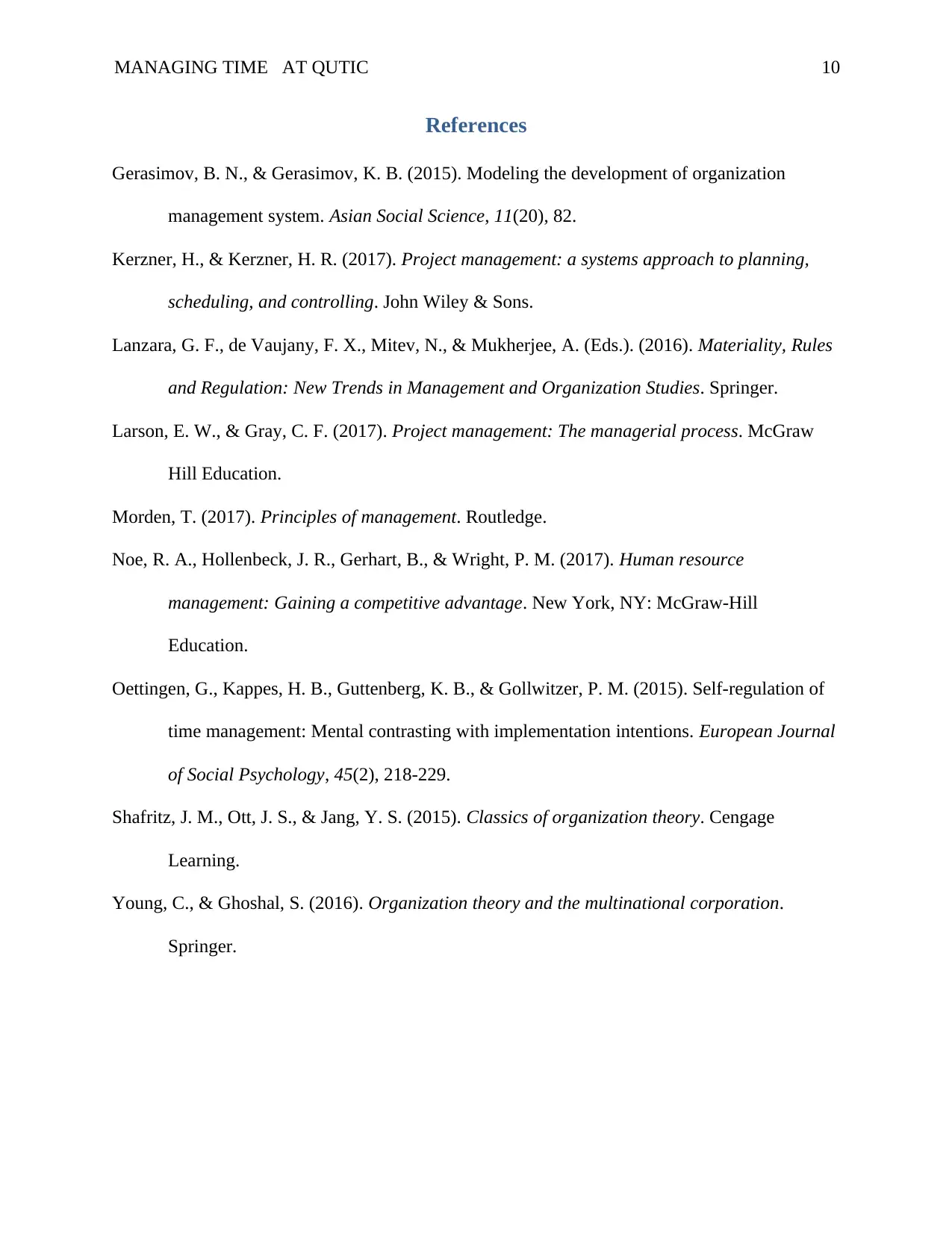
MANAGING TIME AT QUTIC 10
References
Gerasimov, B. N., & Gerasimov, K. B. (2015). Modeling the development of organization
management system. Asian Social Science, 11(20), 82.
Kerzner, H., & Kerzner, H. R. (2017). Project management: a systems approach to planning,
scheduling, and controlling. John Wiley & Sons.
Lanzara, G. F., de Vaujany, F. X., Mitev, N., & Mukherjee, A. (Eds.). (2016). Materiality, Rules
and Regulation: New Trends in Management and Organization Studies. Springer.
Larson, E. W., & Gray, C. F. (2017). Project management: The managerial process. McGraw
Hill Education.
Morden, T. (2017). Principles of management. Routledge.
Noe, R. A., Hollenbeck, J. R., Gerhart, B., & Wright, P. M. (2017). Human resource
management: Gaining a competitive advantage. New York, NY: McGraw-Hill
Education.
Oettingen, G., Kappes, H. B., Guttenberg, K. B., & Gollwitzer, P. M. (2015). Self‐regulation of
time management: Mental contrasting with implementation intentions. European Journal
of Social Psychology, 45(2), 218-229.
Shafritz, J. M., Ott, J. S., & Jang, Y. S. (2015). Classics of organization theory. Cengage
Learning.
Young, C., & Ghoshal, S. (2016). Organization theory and the multinational corporation.
Springer.
References
Gerasimov, B. N., & Gerasimov, K. B. (2015). Modeling the development of organization
management system. Asian Social Science, 11(20), 82.
Kerzner, H., & Kerzner, H. R. (2017). Project management: a systems approach to planning,
scheduling, and controlling. John Wiley & Sons.
Lanzara, G. F., de Vaujany, F. X., Mitev, N., & Mukherjee, A. (Eds.). (2016). Materiality, Rules
and Regulation: New Trends in Management and Organization Studies. Springer.
Larson, E. W., & Gray, C. F. (2017). Project management: The managerial process. McGraw
Hill Education.
Morden, T. (2017). Principles of management. Routledge.
Noe, R. A., Hollenbeck, J. R., Gerhart, B., & Wright, P. M. (2017). Human resource
management: Gaining a competitive advantage. New York, NY: McGraw-Hill
Education.
Oettingen, G., Kappes, H. B., Guttenberg, K. B., & Gollwitzer, P. M. (2015). Self‐regulation of
time management: Mental contrasting with implementation intentions. European Journal
of Social Psychology, 45(2), 218-229.
Shafritz, J. M., Ott, J. S., & Jang, Y. S. (2015). Classics of organization theory. Cengage
Learning.
Young, C., & Ghoshal, S. (2016). Organization theory and the multinational corporation.
Springer.
1 out of 10
Related Documents
Your All-in-One AI-Powered Toolkit for Academic Success.
+13062052269
info@desklib.com
Available 24*7 on WhatsApp / Email
![[object Object]](/_next/static/media/star-bottom.7253800d.svg)
Unlock your academic potential
Copyright © 2020–2026 A2Z Services. All Rights Reserved. Developed and managed by ZUCOL.




